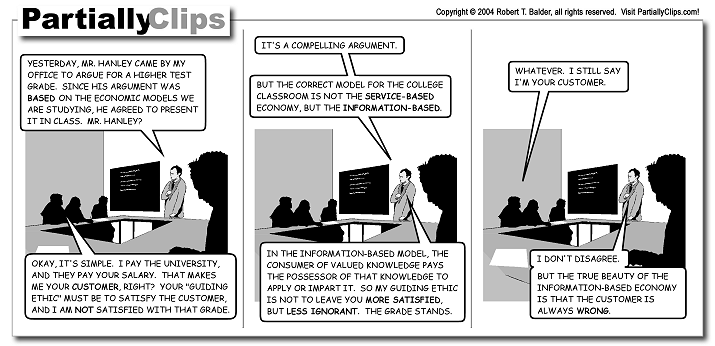December 17, 2004
The economics of grading
A column by Ailee Slater, in the Oregon Daily Emerald of 12/6/2004, presents a striking argument against the method of grading now used in our educational system:
Personally, I have come to the conclusion that the University system makes absolutely no sense. Students pay teachers to educate us, yet they are then allowed to tell us how much we're learning. The whole situation seems akin to a boss paying her employee to clean toilets and the employee turning around and telling the employer how much she is or isn't happy with the cleaning job. If I'm paying someone to do my housekeeping, I'll be the one to tell the receiver of my hard-earned money exactly how well they did. Shouldn't it be the same with education?
Comments from various perspectives have been echoing around the blogosphere ( here , here, here, here, here, here, here, among others). My favorite, though, is this Partially Clips cartoon, created independently of Ms. Slater's essay:
What seems to bother my colleagues most about Ms. Slater's column is the analogy between teaching college courses and cleaning toilets. But she isn't the first to see knowledge as the result of cleansing:
The ancient tradition that the world will be consumed in fire at the end of six thousand years is true. as I have heard from Hell.
For the cherub with his flaming sword is hereby commanded to leave his guard at the tree of life, and when he does, the whole creation will be consumed, and appear infinite. and holy whereas it now appears finite & corrupt.
This will come to pass by an improvement of sensual enjoyment.
But first the notion that man has a body distinct from his soul, is to be expunged; this I shall do, by printing in the infernal method, by corrosives, which in Hell are salutary and medicinal, melting apparent surfaces away, and displaying the infinite which was hid.
If the doors of perception were cleansed every thing would appear to man as it is: infinite. For man has closed himself up, till he sees all things thro' narrow chinks of his cavern.
However, Blake failed to specify any technique for evaluating the degree of cleanliness of the doors of perception. Nor did he specify who should be responsible for the evaluation. His main prescription for educational advancement is clear, though, and must work to some extent, since it has been followed by students since the first universities were established about a thousand years ago.
I like the idea of a system in which there is only one formal grade -- call it "success" -- but students vary in how long it takes them to get it. For scheduling reasons, this is completely impractical in most settings, but it's essentially how the post-graduate system works. We don't formally evaluate the relative quality of PhDs -- you either get one, or you don't. Evaluation, comparative or otherwise, is informal, and works in both directions. Institutions and individual faculty are evaluated in terms of the quality of the students they turn out, just as new PhDs are evaluated in the job market in terms of the perceived qualities of their dissertation research and its presentation.
[Cartoon reference due to Geoff Pullum]
Posted by Mark Liberman at December 17, 2004 10:00 PM
